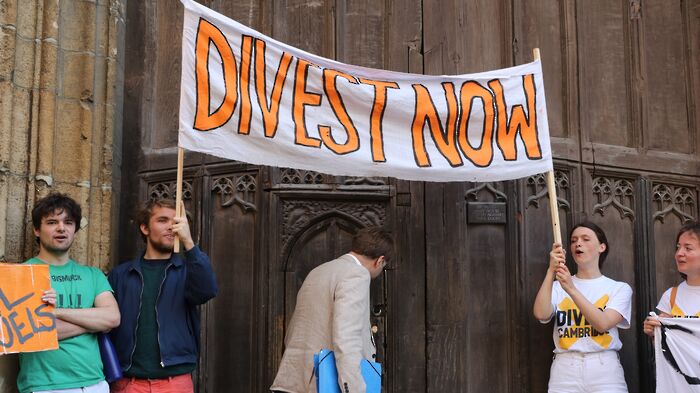Divestment, drinking societies and democracy: a Cambridge year in review
Reflecting upon this academic year, Senior Opinion Editor Vivienne Hopley-Jones discusses democracy and responsive change in our University

An academic year in Cambridge is often an overwhelming amalgamation of personal and political struggles and successes. This past year University politics has been dominated by issues from the building pressure on the University to divest, to staff and student strikes.
On a personal level, the year has felt something like a whirlwind, especially as a fresher entering into the world of hectic essay deadlines and student politics. Whether the terms have dragged or flown by, I’m sure we can all be in agreement that a year at Cambridge really is something.
Bit by bit we can look back on the ways we have shaped this historic institution
Responsive change is something Cambridge students have continued to fight for this year, and bit by bit we can look back on the ways we have shaped this historic institution. Substantial progress will be felt by all exam-taking students, as this year is the first year in which students have been offered an opt-out on class lists. A campaign that has been hard-fought on a long-debated topic, class list opt-outs have been presented as a partial solution to the academic environment that can at times be damaging to the mental well-being of students.
The power vested in the students who make up the University has also been significantly highlighted in another area of activism: through the form of Cambridge Zero Carbon Society. The student-led Zero Carbon campaign has played a large role in the debates and news of Cambridge for several years now, culminating in a series of protests and the use of direct action this term as the University’s final decision on the matter became imminent. From hunger strikes to publicity stunts, some of the tactics of the student activists have sparked controversy.
Yes, this has been a year of change and achievement, but it is also a year which highlights that, more than ever, we need to mobilise to create change
Just this week we have seen the University Council finally commit to a decision on divestment. The Council has committed to partial divestment, which has left the activists who supported full divestment dissatisfied with the response. Perhaps here we can see the limits to the influence of student voices, or at least the continued pressures which exist when coming up against long-established institutions, traditions and figures. The divestment debate seems far from over.
The difficulty of producing meaningful change has also been highlighted with drinking societies and their place within our University. Here it is not only the existence of historically-established societies and traditions that constitutes a problem in creating change, but that we also remain riddled with questions of the best way to bring such positive change about.
The Facebook page Grudgebridge, previously a space for sharing general complaints about life as a student, has been transformed into a space whereby anonymous complaints about drinking society culture, often focusing on allegations of bullying, discrimination and sexual misconduct, are shared. While the page has given a platform for issues that have been largely swept under the rug in the past in an explosive way, there is certainly room to think about how these issues can be dealt with in the long term. Yes, this has been a year of change and achievement, but it is also a year which highlights that, more than ever, we need to mobilise to create change to make our university a safer, more inclusive and more modern institution.
The way staff and students mobilised this year should offer a lesson in the ways we ought to defend the type of higher education we want
Efforts to mobilise as students can perhaps draw inspiration from another ongoing issue: the staff strikes of Lent Term. The time, labour and energy which was devoted by staff and students alike during the strikes that occurred over the pension dispute was remarkable to witness. It will perhaps serve as a model of mobilisation in light of other changes in higher education policy, both within our University but also outside of it. Despite some dissatisfaction over the eventual settlement and current outcome of the strikes, for many they represented a sense of unity within our University. This staff-student unity works against the misleading and troubling portrayal in the right-wing media earlier in the year of staff and students being pitted against each other in the largely student-led movement to decolonise the curricula. It will be interesting to see how this bond between the staff and students at the University will manifest in the following academic year and beyond.
The way staff and students mobilised in support of staff pensions this year may also offer a lesson in the ways we ought to continue to work within institutions to defend and define the type of higher education we want in this country. A central facet of this is representation and access at Cambridge. Back in October, Labour MP David Lammy criticised Oxford and Cambridge as “fiefdoms of entrenched privilege” for their underrepresentation of BME students. More recently an open letter from the University emphasised its ongoing commitment to improving the representation of BME students in reaction to a piece published in The Financial Times. The picture of the BME women of Cambridge on the Senate House steps should be recognised as a symbol of how much things are changing. However, it should also serve as a reminder of the long way we still have to go.
As a new batch of freshers prepare to enter the University space, we should again think about who is populating the University and how we all got here. After growing up in one of the most multicultural cities in the country, I remember feeling shocked by the adjustment I initially had to make when coming to Cambridge at the beginning of the year. For Cambridge to continue to strive to be a forward-thinking and world-class institution it must continue to strive to be more diverse; this is as true when it comes to the representation of different classes and educational backgrounds as it is to race and gender. The burden does not rest solely on the institution, but we need to think more widely about the way education is treated and valued in society.
While the academic year can be tied into a neat ending with a series of parties during May Week, the handover of the CUSU sabbatical team and graduation, the debates which have defined this year cannot be drawn to a close so easily. An institution with such an expansive history must also be an institution open to change and willing to be flexible. The debates of today will continue beyond May Week and into next term, and we shall have to wait and see what the events of tomorrow will be, and how the figures of the coming year handle them.
 News / Right-wing billionaire Peter Thiel gives ‘antichrist’ lecture in Cambridge6 February 2026
News / Right-wing billionaire Peter Thiel gives ‘antichrist’ lecture in Cambridge6 February 2026 News / Cambridge students uncover possible execution pit9 February 2026
News / Cambridge students uncover possible execution pit9 February 2026 Features / From fresher to finalist: how have you evolved at Cambridge?10 February 2026
Features / From fresher to finalist: how have you evolved at Cambridge?10 February 2026 News / Epstein contacted Cambridge academics about research funding6 February 2026
News / Epstein contacted Cambridge academics about research funding6 February 2026 News / Churchill plans for new Archives Centre building10 February 2026
News / Churchill plans for new Archives Centre building10 February 2026












